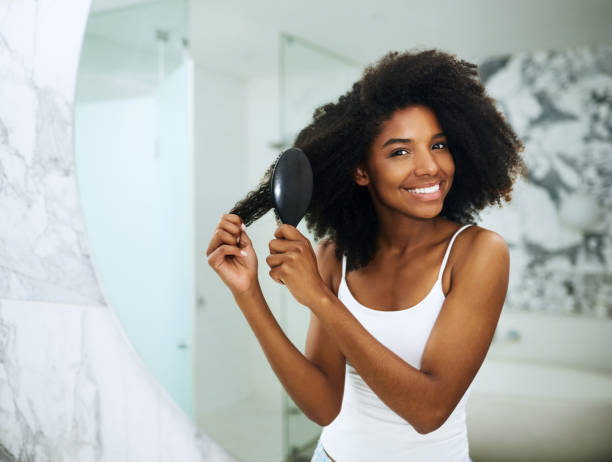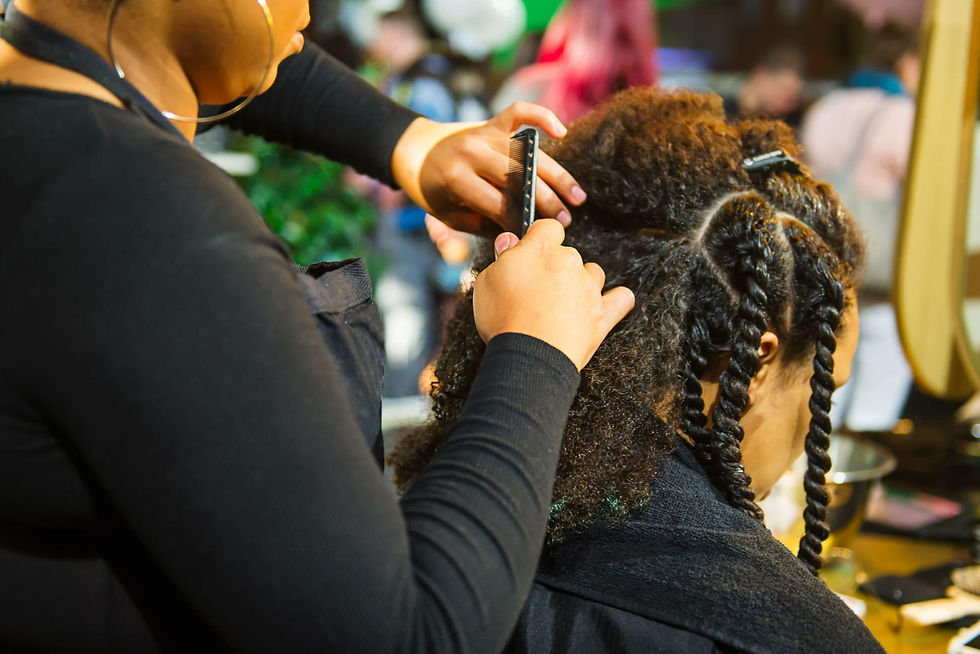To begin with, hair care for African hair is special in its way; it has its texture or so, density and versatility. The needs of African hair necessitate the proper understanding of hair characteristics and proper hair care routine for them to look healthy and shiny. In this guide, you will find all the basic information on proper care for African hair together with useful tips, product suggestions, and recommendations.
Understanding African Hair
Most African hair texture is coyly, curly, or kinky, with such hair type being sensitive to dryness and hence more likely to break. The curls and kinks form what cur lists call texture styling’s around the hair shaft which causes the hair end to be twisted, thus preventing natural oils on scalps from reaching it. To this end dampness maintenance is a basic part of hair care for african american hair.
Key Features of African Hair
-
Density: African hair therefore is commonly known to be denser than other hair types.
-
Porosity: It can be very permeable sometimes, that is, it readily absorbs moisture and at the same time it let goes of it just like that.
-
Fragility: By having a coiled structure, it is more easily broken than the straightened out.
It is important for one to recognize these traits so as to build an effective program that would enhance hair growth.
Essential Tips for Hair Care for African Hair

1. Hydration Is Key
Hydration is actually basic and central to the African hair type. Drinking water keeps the hair moist and reduces the tendency of hair breakage; also makes it easy to manage. This is the way to keep your hair hydrated:
-
Read also: Take a leave-in conditioner of your type to apply every day to provide the hair with moisture.
-
Deep conditioning treatments should be put into practice at least once in a week.
-
Lock in moisture using oils such as argon oil, jojoba oil or Shea butter.
2. Choose the Right Shampoo
To this extent, avoid shampoos that contain sulphate for they remove natural oils from the hair thus worsening the dryness contained in the hair. Another amazing alternative is to co-wash, which means washing the hair with a conditioner rather than a shampoo does a great job at preserving moisture as well.
3. Detangle with Care
Most African hair type is tightly curled, so if you attempt to detangle it without the right tools or without enough patience, you may end up causing serious damage. Always, always, detangle with your wide-tooth comb or your fingers when your hair is wet and coated in a slip solution or a conditioner. This cuts down on the rate of breakage and in so doing exerts less pressure on the hair shaft.
4. Protective Styling
Some of the protective styles are braids, twists, or buns in order to minimize manipulation and hair’s breaking off process. But sometimes these styles should not be very tight, because lack of supply can lead to baldness or thinning of the hair.
5. Night-time Protection
Wear a satin or silk scarf on your hair to bed. If you cannot afford satin, then get a satin pillowcase to use instead. These materials wind together instead of rubbing apart from each other and locking in moisture.
6. Trim Regularly
Some hair damage is inevitable but haircuts should be done after every 6 to 8 weeks, so that the split does not move further up the hair shaft.
Building a Hair Care Routine for African Hair

Morning Routine
-
Moisturize: The first thing to do is to use a water based leave-in conditioner.
-
Seal: To preserve the moisture, use an oil or butter on the chicken.
-
Style: Select an authoritative or low-control keynote.
Evening Routine
-
Detangle: Using your fingers try to comb out the hair or use a wide-tooth comb.
-
Hydrate: Apply a hair moisturizing spray on it.
-
Protect: Tie your hair with a satin fabric, pull it back, and style it with any satin scarf or bonnet.
Common Challenges and Solutions in Hair Care for African Hair
Morning Routine
-
Moisturize: The first step you will need to take will be to apply a water based leave-in conditioner”.
-
Seal: To maintain the moisture use an oil or a butter on the chicken.
-
Style: Choose an authority or low power distance keynote.
Evening Routine
-
Detangle: With fingers try to untangle the hair or use wide-tooth comb if available.
-
Hydrate: Define the hair cut with a hair moisturizing spray.
-
Protect: Braid your hair or put it in a ponytail, make sure you use a satin fabric to tie it, then cover it up with any satin scarf or bonnet.
Recommended Products for African Hair Care
-
Shampoos: The other options that we have are Shea Moisture Jamaican Black Castor Oil Shampoo and As I Am Coconut Co Wash.
-
Conditioners: These are Aussie Marvel Wet Conditioner and Mielle Organics Babassu Oil Profound Conditioner.
-
Leave-Ins: ’Cantu Shea Butter for: Nourishing Natural Leave-In Conditioning Repair Cream, Kinky-Curly Knot Today.
-
Oils: Jamaican Black Castor Oil, Grape seed Oil
- Styling Gels: Original and Aunt Jackie’s Curl Boss Eco Style Gel
Read Also: Blonde Black And Red Hair Color Ideas
The Role of Diet and Lifestyle in Hair Care for African Hair

Hair health is an inside job. A diet that is diet in vitamins and minerals, promotes hair growth and keeps conditions such as loss of hair and thinning at bay. Key nutrients for African hair include:
-
Biotin: Present in eggs, nuts and seeds, it enhances hair.
-
Omega-3 Fatty Acids: They are located in fish, chia seeds, and flaxseeds; also important for the health of the scalp.
-
Iron: It is present in spinach and meat and helps avoid baldness.
Besides, drinking water and avoiding stress can also affect your hair health in a very drastic way.
Embracing the Beauty of African Hair
Hair care for African hair does not only focus on maintaining its quality but embracing the natural beauty of hair find Or Fail. If your hair texture is natural, in twists, buns or flat ironed, knowing and observing your hair type will enable you take great care of it and flaunt it.
Following the guidelines, tips and hair routines discussed in this article, anyone is capable of creating a hair care for african american hair program best suited to him or her. Hear this one again – healthy hair is a process therefore patience is key. Enjoy all the steps and rejoice in growing the most beautiful and stunning hair that all Africans have.
FAQ’s: Hair care for African hair
How can I maintain my African hair healthy?
Use conditioner every time you wash your hair. Be sure to coat the ends of the hair with conditioner, as the ends are the oldest and most delicate section of your hair. Use a hot oil treatment twice a month. This offers more hydration and suppleness to your hair.
Which hair treatment is beneficial for African hair?
Keratin Plus Afro is the treatment particularly intended for Afro or multi-ethnic, Arabic or South American hair, which is exceedingly tough to manage. Thanks to the mixture loaded with wheat proteins, in addition to the smoothing or disciplining effect, it makes Afro hair stronger, healthier, and shinier.
Is African hair hard to maintain?
Afro hair requires a lot of moisture to keep healthy and avoid breakage. The tightly-coiled structure of this hair type makes it more difficult for the natural oils to go down the shaft. Try integrating a leave-in conditioner, such as the Marula Leave-In Hair Conditioner or hair oil into your routine.
What are the downsides of oiling your hair?
While leaving oil on your hair may appear good, extended exposure might have detrimental effects. If hair growth oil is left on for lengthy durations, it can gather debris, block pores, and contribute to dandruff and irritation. Over-saturation may also damage hair strands, rendering them prone to breakage.